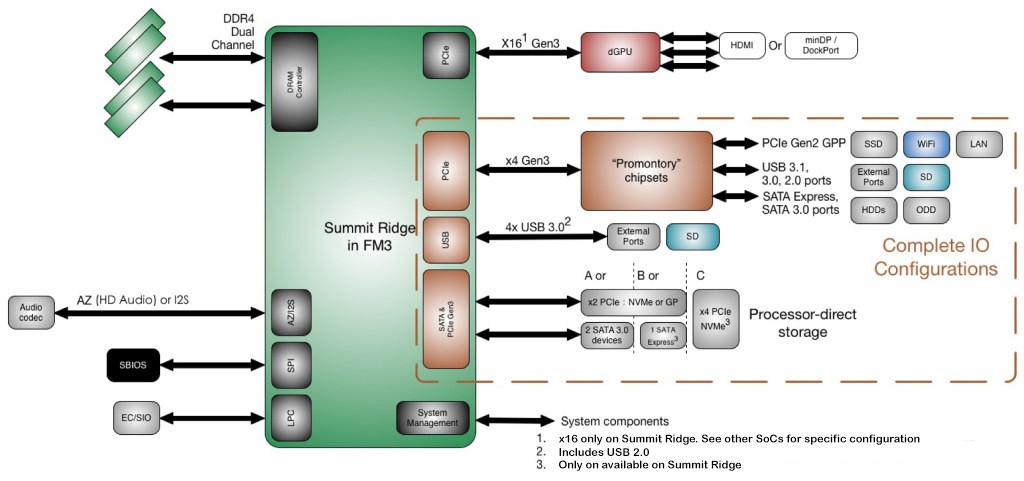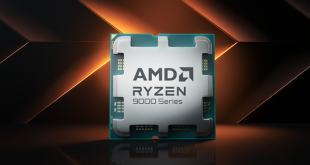Next year Advanced Micro Devices plans to introduce not only all-new accelerated processing units and central processing units, but also fresh platforms for client PCs. While AMD will do a lot to unify its next-gen platforms, there will still be major differences between systems powered by different microprocessors.
AMD’s client platforms next year will rely on code-named “Promontory” core-logic that will support various APUs and CPUs from the company, including code-named “Summit Ridge”, “Bristol Ridge” based on “Zen” micro-architecture and other. All next-gen desktop microprocessors from AMD will use unified AM4 packaging and will be compatible with a variety of appropriate mainboards, which will make it easy for system makers to design PCs powered by AMD’s APUs or CPUs.
AMD “Promontory” chipset will be rather feature-rich: it will connect to processors using PCI Express 3.0 x4 bus (up to 4GB/s of bandwidth) and will support USB 3.1, USB 3.0 and USB 2.0 ports; one PCI Express 2.0 general-purpose port for various controllers; Serial ATA-6Gb/s and SATA Express port(s). Since “Promontory” platform controller hub (PCH) will rely on a single 4GB/s interconnection to microprocessor, do not expect it to enable a lot of 10Gb/s USB 3.1 ports along with numerous fast SATA Express ports.
In fact, the crucial input/output interfaces of AMD’s next-gen client PC platforms will be integrated into APUs and CPUs themselves, according to a block diagram published by BenchLife web-site. AMD’s future microprocessors will built-in processor-direct storage controller: next-gen AMD FX “Summit Ridge” will feature a PCIe 3.0 x4 NVMe port or one PCIe 3.0 x2 along with two Serial ATA 3.0 ports, whereas less advanced “Bristol Ridge” and other chips will support PCIe 3.0 x2 NVMe and two Serial ATA 3.0 ports (or one SATA Express). The upcoming processors will also incorporate four USB 3.0/2.0 ports as well as audio, SPI and LPC interfaces.
What is a bit alarming is that the next-generation AMD FX processors based on “Zen” micro-architecture code-named “Summit Ridge” will support only 16 built-in PCI Express 3.0 lanes for graphics cards, which means that it is not exactly designed for multi-GPU systems with more than two graphics cards.
AMD did not comment on the news-story.
Discuss on our Facebook page, HERE.
KitGuru Says: AMD’s next-gen client PC platform for high-performance APUs and CPUs looks pretty competitive by today’s standards. Unfortunately, the “Summit Ridge” + “Promontory” platform does not support a lot of PCI Express 3.0 lanes, which are needed to build multi-GPU systems with multiple SATA Express (PCIe 3.0 x4) SSDs, like the Intel Z170 does, but it fully supports USB 3.1 and ensures maximum performance for NVMe SSDs thanks to processor-direct storage.
 KitGuru KitGuru.net – Tech News | Hardware News | Hardware Reviews | IOS | Mobile | Gaming | Graphics Cards
KitGuru KitGuru.net – Tech News | Hardware News | Hardware Reviews | IOS | Mobile | Gaming | Graphics Cards




the intel 1150 platform has only ever has 16 PCIe3.0 lanes for graphics (excluding the extra 2.0 lanes), FM3 will be no different. Simply because either platform has no need for more, the expensive motherboards for 1150 that allow high-performance 4-way SLI/crossfire utilise a PLX chip that acts similarly to a network switch. Which works perfectly and even boosts performance in the case of the AMD 295X2 that has its own 32 lane 3.0 PLX.
That being said, I’m still expecting a high-tier platform to replace AM3+, whether or not it will be in the area of the planned 300W APU, or it’ll just be CPU, cores we’ll have to wait see…
This^ . so no need to panic. 😉
“AMD did not comment…” I suspect that’s because [a] you didna ask’em captain [b] this leak is another laod of madeup bllshit.
< col Hiiiiiii Friends….upto I saw the draft ov $8289 , I accept that my father in law woz trully earning money parttime from there labtop. . there moms best frend has been doing this for only about 8 months and recently cleard the mortgage on there house and purchased a new Dodge . linked here HERE’S MORE DETAIL
~~~~~~~~~~~~~~~~~~~~~~~~~~~~~~~~~~~~~~~~~~~~u
300W was due to comparative older process. You can’t put in more and more transistors and still remain on 32/28nm at the same time trying to compete with 22/16/14nm intel counterparts. Take for instance a 244mm2 Kaveri vs a 185mm2 i3 on 22nm die which still beats it. The downside of Abu-Dhabi managed fabs which work out numbers based on cost and profit, even if that remaining getting behind, rather than keeping AMD competitive continuously. It’s not AMD’s fault… and that’s the truth of it. Hopefully, Zen will show potential as I’m willing to help them out even if it’s not the best product on the market, it should at least be a good one. Not to mention my CPU cooler won’t need a new retention clamp, as it would on a new intel board.
> 300W _on_14/16nm using Zen x86_64 and new GCN cores, it’s an ultra compute HSA processor not some common desktop part…
It’s meant to be sold as a common desktop part… which will settle on a price range for a common desktop part… which in turn dictates cost and profit as acommon desktop part. So yeah, 300W on an APU, NEVER! Besides, we’re talking about CPU’s not APUs. In a comparison to intel you don’t mix compute capability as intel’s GPU has none worth mentioning. So CPU vs CPU…
So you believe there will be a 300W part for the mainstream, then deny that will ever happen? Then you go and insist it’s a standard CPU and somehow suddenly intel GPUs come into play…?
What drugs are you on, honestly, besides that you’re trying to make a conversation out of a half-year old comment…